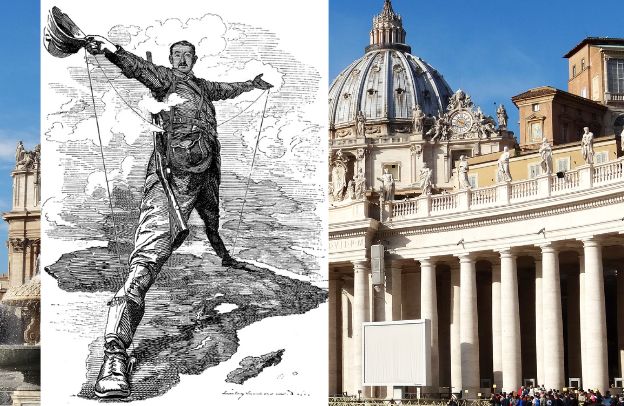Understanding Theocracy Through Transpersonal Political Leadership Development

A theocracy is a form of government in which one or more deities are recognized as supreme ruling authorities, giving divine guidance to human intermediaries who manage the government’s daily affairs. Theocracy is a form of government where it is believed that a god, deity, or group of deities, or a deity is in charge. As written by Professor Oluwafemi Esan, Professor of Transpersonal Psychology
Want to learn more about storytelling? Start by downloading the first chapter of The Storytelling Mastery.
The supreme being is usually thought to rule through human figures, like politicians and clergy, who are believed to be in direct contact with and of direct descent from the supreme being—the state’s government by immediate divine guidance or by officials regarded as divinely guided. (Hirschl, R., 202.)
A recent example in Iran, When the revolution toppled the monarchy in 1979, the new clerical rulers declared an Islamic theocracy and for years discouraged and even cracked down on Persian celebrations that predated Islam, including Chaharshanbeh Suri. (Farnaz Fassihi, New York Times, 13 Mar. 2024).
Recently, in the US, When Trump won the first time, those who would replace democracy with Christian theocracy weren’t prepared, according to social critics. (Anita Chabria, Los Angeles Times, 6 Mar. 2024). The dominant expression of Theocracy in the post-modern world is within authoritarian spirituality.( Ferrero, M., 2013).
See also Introduction To Transpersonal Mental Health Care
Authoritarian Spirituality Breeds Political Dictatorship in Theocracy
Authoritarian spirituality believes in a hierarchical structure of things or authority. This type of spirituality is associated with religious beliefs. In some cases, not following the spiritual rules of religion may cause conflicts. People with authoritarian spirituality can develop a form of fundamentalist religion.
Authoritarians naturally love authoritarian institutions like religion and the military. They love the idea of someone giving orders and others obliged to take orders; they love the idea of strict punishments like courts-martial and hell fires; they love the hierarchal nature of such institutions and forced gestures like saluting and kneeling, and they love the permission such institutions give you to hate others, all those millions of enemies and infidels.
These authoritarianists eventually become political dictators. (Wink, P., Dillon, M. and Prettyman, A., 2007).
A dictatorship is an autocratic form of government characterized by a leader or a group of leaders who hold governmental powers with few to no limitations. The use of Authoritarian Spirituality as a justification for egocentric leadership is the most dangerous form of Theocracy.
Authoritarianism is a political system characterized by rejecting democracy and political plurality. It involves using central solid power to preserve the political status quo and reductions in the rule of law, separation of powers, and democratic voting. Therefore, Authoritarian spirituality will eventually lead to Authoritarianism in a theocratic government.
The religious, political leader in theocratic government often rules with an iron fist with the backing of a spiritual belief system, holding the populace in religious bondage with no regard to freedom of speech and alternative views of political government.
On the contrary, proper transpersonal political leadership development will liberate the populace from Authoritarian spirituality limitations in theocratic government. (Gandhi, J., 2008).
Transpersonal Political Leadership Development in Theocracy
A Transpersonal Leader operates beyond the ego while continuing personal development and learning. They are radical, ethical, and authentic while emotionally intelligent and caring. Theocratic Hierarchical leadership does not work effectively anymore in this increasingly complex world in which society is also changing rapidly.
It requires collaboration, participation, delegation, and distribution of leadership. In addition, to create an ethical, caring, and sustainable culture, Religious leaders in theocratic government need to bring their values to a higher level of consciousness, enabling them to be spiritual and not religious.
True spirituality leads to the development of the transpersonal Self in political leadership. (Young, G. and Knights, J., 2022).
The Transpersonal – Self Development in Political Leadership.
Transpersonal theory proposes that there are developmental stages beyond the adult ego, which involve experiences of connectedness with phenomena considered outside the boundaries of the ego.
The aims of the personal Self are egocentric. To use Maslow’s terminology they are directed to the satisfaction of needs or wants. The spiritual Self is outgoing and radiant; it needs and asks nothing from outside.
The transpersonal is a term used by different schools of philosophy and psychology to describe experiences and worldviews that extend beyond the personal level of the psyche and mundane worldly events.
The individual spiritual growth of religious leaders in theocratic government is the key to unlocking the political potential of these leaders. “Spiritual but not religious” (SBNR), also known as “spiritual but not affiliated” (SBNA), or less commonly “more spiritual than religious”, is the goal of transpersonal political leadership development.
This approach identifies a life stance of spirituality that does not regard organized religion as the sole or most valuable means of furthering spiritual growth. In addition, developing the transpersonal Self in political leadership leads to leading beyond the ego. (Assagioli, R., 1991).
Leading Beyond the Ego In Theocracy
Transpersonal leaders operate beyond their ego, and they are better leaders. Better for the people who follow them and the world we live in. Ego-free leaders create purpose-driven leadership.
They operate highly functional teams that operate beyond the fear that ego-based leadership creates. Egocentricism is taking one’s perspective on spiritual matters, excluding focusing on God’s view. Spiritual egocentrism can thus be defined as taking one’s view, hence failing to consider the transpersonal purpose of the Divine in a given situation.
Egocentric theocratic leaders are manipulative and control-driven individuals. They worship the God of Self by turning themselves into deities. They often suffer from a messiah complex. The messiah complex is a mental state in which a person believes they are a messiah or prophet and will save or redeem people in a religious endeavor.
The term can also refer to a state of mind in which an individual believes they are responsible for saving the nation in a theocratic political leadership context. Transcending spiritual egocentrism in Theocracy requires discovering and developing transpersonal purpose in political leadership. (Young, G., Knights, J. and Grant, D. eds., 2018).
Discovering Transpersonal Purpose In Theocracy
A Transpersonal leader follows an idealistic, generous, creative, and spiritual purpose. The individual may reach a point where his sense of purpose becomes transpersonal.
This emerges as he moves beyond an egoic orientation when his desires, interests, and fears begin to fade in importance, and he connects to a more significant superconscious source, for which he becomes the expression of Divine Purpose. A purpose that is natural to us is an expression of our innate potentials and inclinations, aligning ourselves to divine assignment in political leadership.
You might also want to see Professor Oluwafemi Esan
At this point, purpose becomes more effortless. Transpersonal leaders don’t need to strain or exhaust themselves, pushing their purpose forward, trying to realize their ambitions, or achieving their goals. They become the practical expression of Divine solutions in political leadership.
The important thing is to step aside and put our personal interests, desires, and fears aside so that we don’t block or distort our divine purpose in our position of political leadership.
Purpose can guide life decisions, influence behavior, shape goals, offer a sense of direction, and create meaning. In transpersonal political leadership, purpose is connected to the political vocational calling. Acknowledging the divine calling in political leadership is the foundation of visionary leadership in Theocracy.
A visionary leader sets a long-term vision, creates a strategic plan to achieve that vision, and empowers others to collaborate toward that shared goal. Therefore, the development of transpersonal political leadership creates a culture of growth among the people in a theocracy. (Taylor, S., 2016).
Reference List
- Hirschl, R., 2021. Theocracy. In Routledge Handbook of Illiberalism (pp. 152-163). Routledge.
- Ferrero, M., 2013. The rise and demise of Theocracy: theory and some evidence. Public choice, 156, pp.723-750.
- Wink, P., Dillon, M. and Prettyman, A., 2007. Religiousness, spiritual seeking, and authoritarianism: Findings from a longitudinal study. Journal for the Scientific Study of Religion, 46(3), pp.321-335.
- Gandhi, J., 2008. Political institutions under dictatorship.
- Young, G. and Knights, J., 2022. Understanding transpersonal leadership. In Transpersonal Leadership in Action (pp. 4-18). Routledge.
- Assagioli, R., 1991. Transpersonal development. Patrick Stephens.
- Young, G., Knights, J. and Grant, D. eds., 2018. Leading beyond the ego: How to become a transpersonal leader. Routledge.
- Taylor, S., 2016. A model of purpose: From survival to transpersonal purpose. Transpersonal Psychology Review, 18(1).
Want to learn more about storytelling? Start by downloading the first chapter of The Storytelling Mastery.





